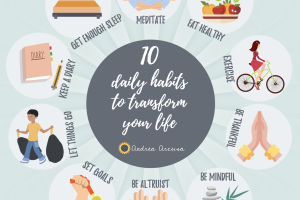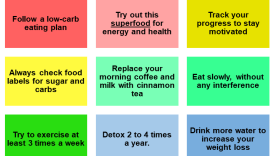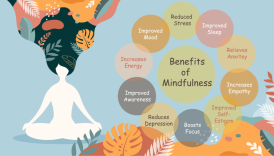10 Daily Habits for a Healthier Life

Importance of Daily Habits
In our fast-paced lives, daily habits often become the foundation upon which our overall well-being rests. Establishing positive routines can lead to profound changes in our lives, significantly enhancing our quality and enjoyment. For instance, consider how a simple morning ritual—be it enjoying a quiet cup of tea or engaging in a few minutes of meditation—can set a constructive tone for the day ahead. Here are some essential daily habits that many people find beneficial:
- 10 Daily Habits for a Healthier Life
- Importance of Daily Habits
- Impact on Overall Health
- Hydration Habits
- Drinking Enough Water
- Benefits of Staying Hydrated
- Nutritional Habits
- Balanced Diet
- Importance of Meal Planning
- Exercise Habits
- Daily Physical Activity
- Incorporating Strength Training
- Sleep Habits
- Consistent Sleep Schedule
- Creating a Relaxing Bedtime Routine
- Stress Management Habits
- Mindfulness Practices
- Importance of Stress Reduction
- Social Connection Habits
- Building Supportive Relationships
- Participating in Community Activities
- Mindfulness Habits
- Practicing Gratitude
- Mindful Eating
- Productivity Habits
- Time Management Techniques
- Setting Realistic Goals
- Personal Growth Habits
- Continuous Learning
- Journaling for Self-Reflection
- Morning Routines: Waking up at the same time and engaging in consistent practices can boost productivity.
- Healthful Eating: Choosing nourishing foods over processed options promotes better physical health.
- Regular Exercise: Incorporating movement into daily life helps keep energy levels high.
Impact on Overall Health
The accumulated effects of daily habits can significantly influence not just physical health but also mental and emotional well-being. Adopting good habits can lead to improved mood, increased energy levels, and enhanced resilience against stress. For example, someone who commits to a balanced diet and regular exercise often notices a boost in their mental clarity and decreases in anxiety. Ultimately, nurturing these daily practices creates a cycle of health that reinforces itself, demonstrating that small, consistent actions can create remarkable outcomes over time.
Hydration Habits
Drinking Enough Water
Transitioning from the foundation of daily habits, another often overlooked yet crucial aspect of health is proper hydration. Drinking enough water is essential for maintaining energy levels, managing hunger, and supporting every system in the body. Many individuals may underestimate their water intake, leading to fatigue or reduced focus. Keeping a water bottle with you throughout the day can serve as an excellent reminder! Here are a few tips to ensure adequate hydration:
- Set Reminders: Use your phone or a watch to remind you to take a sip every hour.
- Flavor Your Water: Add slices of fruit or herbs to make hydration more enjoyable.
- Track Intake: Consider using an app to monitor your daily water consumption.
Benefits of Staying Hydrated
Staying hydrated contributes to numerous benefits that resonate well beyond thirst. Here are some key impacts of adequate hydration:
- Enhanced Physical Performance: Proper hydration helps improve endurance and strength during workouts.
- Improved Digestion: Water aids in the breakdown of food, ensuring better nutrient absorption.
- Better Skin Health: Hydrated skin appears more radiant and is less prone to dryness.
Overall, making a conscious effort to drink enough water each day can lead to significant improvements in both physical health and emotional well-being. By prioritizing hydration as part of your daily habits, you set yourself on the path to a healthier, more vibrant life.
Nutritional Habits
Balanced Diet
Building on the importance of hydration, another pillar of maintaining overall health is adopting a balanced diet. Consuming a variety of foods ensures that your body receives essential nutrients, vitamins, and minerals it needs to function effectively. Many people find it challenging to maintain balance due to busy schedules, which is where mindfulness towards nutrition comes into play. A balanced diet typically includes:
- Fruits and Vegetables: Aim for a colorful plate to maximize nutrient intake.
- Whole Grains: Opt for brown rice, whole wheat bread, and oats for sustained energy.
- Lean Proteins: Include sources like chicken, fish, legumes, and nuts for muscle health.
Personal experience shows that simply focusing on a colorful plate can make meals feel more exciting.
Importance of Meal Planning
Meal planning takes this a step further by encouraging intentional choices and reducing the temptation for unhealthy snacking. By dedicating a little time each week to outline your meals, you can ensure that you’re hitting your nutritional goals. Consider these meal planning benefits:
- Saves Time: Preparing meals in advance eliminates the last-minute rush.
- Reduces Waste: Planning helps in using perishable items before they spoil.
- Promotes Healthier Choices: Knowing what you’ll eat helps you resist unhealthy options.
In essence, combining a balanced diet with effective meal planning can simplify your nutritional habits, making healthy eating more attainable and enjoyable in your everyday life.
Exercise Habits
Daily Physical Activity
Following a focus on nutrition, integrating daily physical activity is essential for overall health. It doesn’t require a gym membership or an elaborate routine; simple habits can make a significant difference. Even short bursts of movement throughout the day can energize and uplift mood. For instance, a quick walk during lunch not only increases your step count but also offers a mental reset. Here are some quick ways to incorporate daily activity:
- Take the Stairs: Choose stairs over elevators whenever possible.
- Walk or Cycle: Opt for walking or cycling instead of driving for short distances.
- Stretch Breaks: Take regular breaks from sitting to stretch.
Incorporating Strength Training
While daily activity is vital, integrating strength training into your routine is equally important for building muscle and improving overall strength. This not only aids in better posture but also boosts metabolism. Personal experience highlights that even short sessions with resistance bands or bodyweight exercises can yield impressive results. Consider adding these strength training approaches:
- Bodyweight Exercises: Start with push-ups, squats, or lunges.
- Resistance Bands: Incorporate bands for added challenge without heavy weights.
- Consistency: Aim for at least two days a week focused on strength.
By combining daily physical activity with strength training, you create a balanced exercise regimen that promotes overall health and vitality. This multifaceted approach to fitness keeps motivation high and barriers low.
Sleep Habits
Consistent Sleep Schedule
Transitioning from the physical aspects of wellness, sleep habits play a crucial role in overall health. A consistent sleep schedule lays the foundation for restful nights and productive days. Much like a well-regulated clock, our bodies thrive on routine. Going to bed and waking up at the same time each day signals the body to enter a healthy rhythm. To establish a consistent sleep schedule, consider these tips:
- Set a Regular Bedtime: Aim to go to bed at the same time each night, even on weekends.
- Use Alarm Clocks: Set an alarm for bedtime just like you would for waking up.
- Limit Naps: Keep daytime naps brief and avoid napping late in the afternoon.
Creating a Relaxing Bedtime Routine
Alongside a consistent schedule, developing a calming bedtime routine can enhance sleep quality. Engaging in relaxing activities signals to the body that it’s time to unwind. Personally, I find that dimming the lights and reading a book works wonders. Here are some steps to create a soothing bedtime routine:
- Turn Off Screens: Limit exposure to electronics at least an hour before bed.
- Engage in Relaxation Techniques: Try meditation or gentle stretching to ease tension.
- Create a Cozy Environment: Keep your bedroom cool, quiet, and inviting to sleep.
By prioritizing a consistent sleep schedule and establishing a winding-down routine, you can significantly improve your sleep quality, paving the way for better health and well-being.
Stress Management Habits
Mindfulness Practices
Continuing on the journey of overall health, incorporating effective stress management habits is essential. Mindfulness practices can be a powerful tool to help navigate the daily challenges we all face. Personally, I’ve found that taking just a few minutes each day to focus on my breathing or engage in meditation significantly reduces feelings of overwhelm. Here are a few mindfulness practices to try:
- Deep Breathing: Inhale deeply for five counts, hold for five, and exhale slowly. Repeat several times.
- Guided Meditation: Use apps or online resources to follow along with guided sessions.
- Mindful Walking: Take a walk while paying attention to each step and your surroundings.
Importance of Stress Reduction
The importance of stress reduction cannot be overstated. Persistent stress can lead to serious health issues, including anxiety, heart disease, and weakened immune function. Managing stress effectively enhances not only physical health but also emotional well-being. Benefits of reducing stress include:
- Improved Focus: A calm mind promotes clearer thinking and decision-making.
- Better Relationships: Reduced stress often leads to more patience and understanding with others.
- Enhanced Resilience: Learning to manage stress fosters greater emotional strength in facing life’s challenges.
Incorporating mindfulness and understanding the importance of stress reduction can create a profound impact on one’s overall quality of life. Making these practices habitual not only nurtures well-being but also empowers individuals to thrive under pressure.
Social Connection Habits
Building Supportive Relationships
Following mindfulness and stress management, nurturing social connection habits is another vital element for overall well-being. Building supportive relationships creates a safety net of encouragement and love that we can lean on during tough times. From personal experience, having a close-knit group of friends has made all the difference in navigating life’s ups and downs. To foster supportive relationships, consider these strategies:
- Regular Check-Ins: Schedule time for phone calls or coffee dates with friends and family.
- Active Listening: Show genuine interest in what others have to say, fostering deeper connections.
- Express Gratitude: A simple “thank you” or a heartfelt note can enhance bonds.
Participating in Community Activities
Participating in community activities further solidifies social connections and enriches your social life. Engaging with neighbors or local groups opens the door to new friendships while providing a sense of belonging. For example, joining a local book club or volunteering at community events not only fills social calendars but also reinforces a positive community spirit. Here are ways to get involved:
- Volunteer Work: Sign up at local charities or shelters to give back while meeting like-minded individuals.
- Join Clubs or Classes: Take up hobbies or interests through local classes to connect with others.
- Attend Local Events: Keep an eye out for community festivals, fairs, or workshops.
By focusing on building supportive relationships and actively engaging in community activities, individuals can create a robust support system that fosters happiness and resilience. These connections enrich our lives and contribute significantly to our mental and emotional health.
Mindfulness Habits
Practicing Gratitude
Now that we’ve explored the importance of social connections, let’s dive into mindfulness habits that can enhance your overall well-being. One impactful practice is cultivating gratitude. Implementing a gratitude practice into daily life can shift your focus from what might be lacking to recognizing the abundance around you. Personally, keeping a weekly gratitude journal has transformed my perspective, prompting me to appreciate even the small joys. Here are some ways to practice gratitude:
- Gratitude Journaling: Dedicate a few minutes each day to write down three things you’re thankful for.
- Gratitude Jar: Keep a jar where you drop in notes of appreciation whenever something good happens.
- Express Thanks: Take time to express gratitude to those around you, reinforcing bonds and spreading positivity.
Mindful Eating
Alongside gratitude, mindful eating is a powerful mindfulness practice that promotes awareness and satisfaction during meals. It encourages paying attention to the flavors, textures, and sensations of food, fostering a healthy relationship with what we eat. Personally, I find that savoring each bite not only enhances my enjoyment but also helps prevent overeating. To practice mindful eating, consider these tips:
- Eliminate Distractions: Turn off screens and focus solely on your meal to truly savor the experience.
- Slow Down: Chew your food thoroughly and take breaks between bites to appreciate each flavor.
- Listen to Your Body: Tune in to hunger cues and eat until you’re satisfied, not stuffed.
By incorporating gratitude and mindful eating into your daily routine, you can foster greater awareness and appreciation in your life, leading to a more fulfilling and present existence.
Productivity Habits
Time Management Techniques
Moving forward from mindfulness habits, enhancing productivity is crucial for achieving personal and professional goals. Effective time management techniques can make a significant difference in how one approaches daily tasks. One strategy I’ve found beneficial is the Pomodoro Technique, which involves working in focused bursts followed by short breaks. This method not only boosts concentration but also keeps motivation high. Here are a few time management techniques to consider:
- Prioritize Tasks: Use the Eisenhower Matrix to differentiate between urgent and important tasks.
- Set Timers: Break your work into 25-minute intervals with 5-minute breaks in between.
- Batch Similar Tasks: Group similar responsibilities together to minimize context switching.
Setting Realistic Goals
Another essential productivity habit is setting realistic goals. By establishing achievable objectives, you can avoid overwhelm and stay motivated. Personally, I’ve learned to break larger projects into smaller, manageable tasks, making the process feel less daunting. To set realistic goals:
- Use the SMART Framework: Make sure your goals are Specific, Measurable, Achievable, Relevant, and Time-bound.
- Set Milestones: Create checkpoints along the way to celebrate progress and maintain motivation.
- Be Flexible: Adjust your goals as needed, allowing for growth and change.
By implementing effective time management techniques and realistic goal-setting, individuals can enhance their productivity and create a sense of accomplishment in their everyday lives. These habits not only lead to success but also cultivate a more balanced and fulfilling existence.
Personal Growth Habits
Continuous Learning
As we wrap up our discussion on productivity habits, we can seamlessly delve into personal growth habits that significantly enrich our lives. One of the most impactful elements of personal development is the commitment to continuous learning. Embracing the mindset of a lifelong learner not only expands knowledge but also keeps the mind sharp and adaptable. Personally, I’ve made it a habit to listen to educational podcasts during my morning commute, which has opened my eyes to various subjects. Here are some ways to foster continuous learning:
- Take Online Courses: Platforms like Coursera and Udemy offer a vast array of courses at your fingertips.
- Read Regularly: Set a goal to read a certain number of books each month, exploring diverse topics.
- Join Discussion Groups: Engage with others to share ideas and insights.
Journaling for Self-Reflection
Another valuable personal growth habit is journaling for self-reflection. Documenting experiences and thoughts can provide clarity, strengthen self-awareness, and facilitate personal growth. I often sit down at the end of each day to jot down my thoughts, which helps me process emotions and reflect on daily experiences. To make the most of journaling:
- Start with Prompts: Use prompts like “What did I learn today?” or “What can I improve on?” to guide your reflections.
- Maintain Consistency: Even a few minutes daily can create a powerful habit over time.
- Review Regular Entries: Looking back at previous entries helps identify patterns and growth over time.
By embracing continuous learning and journaling for self-reflection, individuals can cultivate a richer, more fulfilling journey of personal growth. These habits empower self-discovery and open doors to new opportunities and insights.




